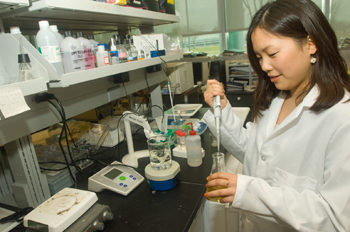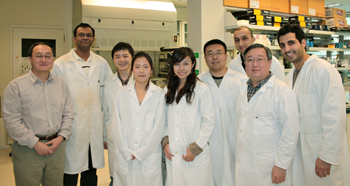Learning Research Techniques Through the Study of ALS
 |
Sophomore Hyojung Seo of Seoul, South Korea, conducts experiments designed to identify new powerful RNA inhibitors called aptamers that may result in drug candidates to treat ALS and stroke. (Photo Mark Schmidt) |
Inside the Life Sciences Research laboratory of Professor Li Niu, Yan Han, a fourth-year doctoral student from Beijing, China, is conducting measurements using an electrophysiology/laser setup with live cells. These cells harbor the special family of proteins called glutamate ion channel receptors that are indispensable to brain function such as memory and learning.
Abnormal function of these proteins is implicated in neurological disorders and diseases like Amyotrophic Lateral Sclerosis (ALS) and stroke. Niu's research seeks to find inhibitors as potential drug candidates for treatments of these diseases.
At another bench, sophomore Hyojung Seo, of Seoul, South Korea, is checking out a large number of sequences from an RNA library to identify new powerful RNA inhibitors called aptamers. In these aptamers lies the potential to find better treatments for ALS, more commonly known as Lou Gehrig�s disease.
"Our long-term goal is to understand the structure and function of these receptors, and to design better inhibitors as potential drug candidates for new therapies," said Niu.
Reading about UAlbany in New Zealand, where she was attending high school, Seo had the impression that Albany, as the capital of New York State, was a big metropolis. Upon arriving, she found it to be more "peaceful" than she expected and more conducive to studying.
"The greatest benefit of working along side Dr. Niu is the opportunity to learn about technique and biological concepts," said Seo, who stayed in Albany over the winter break to work in the lab. She now plans to enroll in UAlbany�s B.S./M.S. program in chemistry to continue conducting research in Niu�s lab.
 |
From left: Li Niu, Sabarinath Jayaseelan (graduate student), Dr. Zhen Huang (postdoctoral fellow), Ms. Hyojung Seo (undergraduate), Ms. Yan Han (graduate student), Joe Wang (graduate student), Dr. Jae Seon Park (front, postdoctoral fellow), Vurghun Ahmadov (back, graduate student) and Mohammad Qneibi (graduate student).
|
Han was surfing the Web one day looking for information about graduate schools when she found Niu's faculty Web site and his research interests.
"The techniques he uses are exactly what I wanted to learn for my research," said Han, who studied neurosciences and did some brain research in medical school at Beijing University. "Dr. Niu is one of the most enthusiastic scientists I have ever known. He loves his job; he is crazy about it."
Niu believes teamwork is a critical part of learning for a researcher to become successful.
Lab research gives Niu's students a strong foundation whether they want to be cardiologists, pediatricians, or are considering joining the pharmaceutical biotech industry, as Han is.
Niu's lab is currently supported by grants from the National Institutes of Health, Department of Defense, and the Muscular Dystrophy Association.
![]() For more news, subscribe to UAlbany's RSS headline feeds
For more news, subscribe to UAlbany's RSS headline feeds


